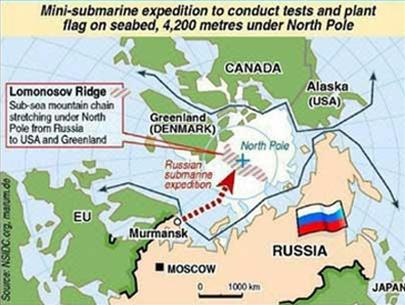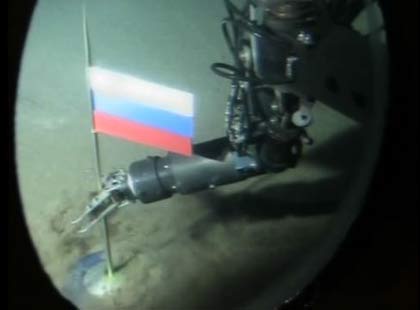The arctic has been 'hot'!
'Russians send submarines to plug a small flag in the Arctic Ocean, and we send our prime minister,' a Canadian government source announced on August 9 on Kommersant (Russia) about his trip. Day (August 8) in the Arctic of Prime Minister Stephen Harper.
Stephen Harper's trip was prepared in advance, but it was especially significant after Russia's "Arctic 2007" survey.During his visit, he announced the expansion of Nahanni National Park, established a training facility to train soldiers to participate in campaigns in the Arctic climate, announcing the decision to build a deep-water port at one of the Canadian population spots on the Arctic Ocean.
Harper's visit coincided with the Canadian Army's NANOOK - 07 scale exercises, involving 600 soldiers of the army;The canada.com newsletter called 'the $ 3 million performance'.Lieutenant-general Marc Dumais said the operations were an important step to securing the country's sovereignty, although the nature of the exercise showed Ottawa's intention in the Arctic battle, in particular. is after the Russians flagged under the Arctic Ocean on August 2.

The Russian location flags the bottom of the ocean, on the Lomonosov underground circuit Russia wants to prove as an extension of the Siberia continental shelf (Photo: AFP)
Canadian Foreign Minister Peter McKay criticized: 'It is not the 15th century. It is impossible to travel the world, flag and say we claim this territory is mine'. Prime Minister Harper also said: 'The Russian flag again shows that Canada must protect its Arctic sovereignty'.

Robotic arm on Mir-1 submarine plugs Russian flag at the bottom of the Arctic Ocean (Photo: AP, Bloomberg)
On the surface, Canada's positive in the Arctic (including military) does not seem to worry Russians.'All countries with research rights can conduct such activities if they take place within the legal framework' - a representative of the Russian Information Ministry A. Krivtsov commented on Canadian moves in the Arctic . However, he advised Canada not to say anything about the Russian flag on the ocean floor. Mr. Krivtsov said: 'We went there first and re-plugged the flag. What is there to answer? '
So far after Russia, the US and Canada have participated in affirming Arctic sovereignty . Shortly after the Russian survey team returned successfully, the US Coast Guard sent an icebreaker to the Bering Sea. International law expert Michael Byers of the University of British Columbia (USA) commented: 'Of course scientific research is going on, but events also have the nature of a space race. We (Americans) need to think of this as our Moon mission, which requires a similar level of political commitment (the conquest of the Moon). We are playing with the giants here. '
NG.THANH
According to Kommersant; Canada.com, Youth
Canada used to claim its sovereignty in the Arctic since the late 1950s. At that time the international court refused to claim this claim, but there was a verdict that the territory could become Canada if in a century no one else prove the Arctic Ocean belongs to them. Not wanting to sit and wait, the Canadian government decided to push the program to build eight patrol boats on the sea worth more than US $ 7 billion.
In addition, Prime Minister Harper also tried to remind the Conservative Party's previous promises of leadership over buying some icebreakers that could go on 6m thick ice. Canada also has another ambitious project: 'The Road to Tuk', which allows the city to be connected to the coast of Tuktoyaktuk to the southern part of the country and thereby establish a permanent route to the Arctic Ocean.
- Interesting facts about animals living in the Arctic
- Arctic sea ice area is at a record low
- Every second 14,000 tons of water flows into the sea because the Arctic ice melts
- The volume of ice in the Arctic drops to a record low
- The Arctic lost three times as much ice as Belgium every day
- The extraordinary journey of the Arctic fox
- Arctic ice is melting record fast
- Perennial ice in the Arctic is disappearing
- Volcano under the Arctic ice
- Ice in the Arctic is likely to disappear by 2030
- The Arctic temperature is the highest in 44,000 years
- Earth warms, the Arctic will explode vegetation
 Surprised: Fish that live in the dark ocean still see colors
Surprised: Fish that live in the dark ocean still see colors Japan suddenly caught the creature that caused the earthquake in the legend
Japan suddenly caught the creature that caused the earthquake in the legend A series of gray whale carcasses washed ashore on California's coast
A series of gray whale carcasses washed ashore on California's coast Compare the size of shark species in the world
Compare the size of shark species in the world After 389 days in the Arctic, costing more than $160 million, hundreds of scientists brought back bad news: What was it?
After 389 days in the Arctic, costing more than $160 million, hundreds of scientists brought back bad news: What was it?  Arctic refreezing plan achieves positive results
Arctic refreezing plan achieves positive results  Let's look at the last flower clusters in the world's polar regions
Let's look at the last flower clusters in the world's polar regions  Proposing 2 'utopian' initiatives to 'save' the polar ice sheet, at first glance everyone thought it was a fantasy
Proposing 2 'utopian' initiatives to 'save' the polar ice sheet, at first glance everyone thought it was a fantasy  Huge wormhole discovered at the bottom of the Arctic Ocean
Huge wormhole discovered at the bottom of the Arctic Ocean  Climate change causes more lightning in the Arctic
Climate change causes more lightning in the Arctic 